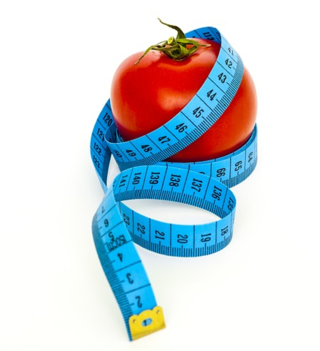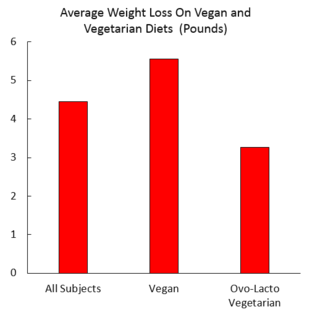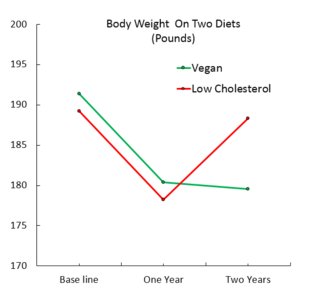Diet
Will You Lose Weight By Giving Up Meat?
A new study compares vegetarian and vegan diets.
Posted January 11, 2016 Reviewed by Jessica Schrader

You know the statistics. Seventy percent of Americans are overweight or obese, the medical costs associated with obesity exceed $50 billion a year, and 1 in 5 deaths in the United States are attributed to obesity.
According to a Gallup poll, about 75% of women and 50% of men have tried to lose weight, but most of them have failed miserably. Researchers have found that people can lose 5% to 10% of their body weight fairly easily. The problem is that this weight loss is nearly always temporary.
The average American adult would like to shed about 16 pounds. But they are fighting an uphill battle. In an article published in The American Psychologist, Traci Martin and her colleagues at UCLA reviewed the research on the effectiveness of dieting (here). Their findings are depressing. Most people don’t stick with their diets, but even people who stay on their diets for at least two years typically lose only three or four pounds. And a surprisingly large number of dieters actually regain more weight than they lose. Martin concluded, “In sum, across these studies, there is not strong evidence for the efficacy of diets in leading to long-term weight loss.”
What About Vegetarian and Vegan Diets?
My friend Linda bucked this trend. She lost 40 pounds, and, even more impressive, she has remained slim and trim for the last 15 years. How, you ask? Linda changed both her behavior and what she ate. She embarked on a rigorous daily exercise program, and she gave up eating meat. Because she changed her diet and her activity level at the same time, we can’t disentangle the roles of exercise and diet in her successful effort to shed pounds. Fortunately, a new study published in the Journal of General Internal Medicine helps answer the question: how much weight will you lose by give up meat? And they also compared the relative effectiveness of vegetarian and vegan diets.
The research involved a technique called meta-analysis. This is a method of combining the findings from multiple studies to look for consistent patterns of results. The aphorism “garbage in, garbage out” applies to meta-analyses. For this reason, researchers usually establish quality control criteria for studies they include in the analysis. In this case, the researchers only used “randomized clinical trials” - studies in which subjects were randomly assigned to either a no-meat condition or an omnivore condition.
Twelve published studies met the criteria. Eight examined vegan diets (no meat, no dairy, and no eggs) and four assessed ovo-lacto vegetarian diets (no meat but dairy and eggs were permitted). The 12 studies included a total of 1,151 subjects, and, on average, the diets lasted 18 weeks. (The range was from eight weeks to two years.)
What They Found

The good news is that individuals on both vegetarian and vegan diets lost weight when compared to subjects in the meat-eating control groups. On average, the non-meat eaters lost 4.5 pounds. The vegans lost an average of 5.5 pounds and the ovo-lacto vegans lost 3.3 pounds. (A recent randomized control trial not included in the meta-analysis also found that vegans lost more weight than vegetarians – here).
There are, however, a couple of caveats. The quality of clinical trials are evaluated on a standardized scoring scale called the Jadad system. As gauged by their Jadad score, 7 of the 12 studies in the meta-analysis fell into the “low quality” category. This means they contained sufficient methodological problems that we cannot be highly confident in the validity of the results.
In addition, only one of the studies lasted two years—the benchmark for long-term weight loss. It measured weight loss in obese post-menopausal women, half of them on a vegan diet and half on a low cholesterol diet that contained some meat.

The women in both groups lost about 10 pounds over the first year. However, the subjects in the meat group (the red line) gained nearly all their weight back by the end of the second year. In contrast, the vegans generally kept their weight down (the green line.). Even though the study fell into the poor quality methodology category, the results are encouraging.
There are, of course, other health advantages besides weight loss for giving up meat. For instance, my friend Ben is a long-distance runner in his 40s. He is athletic and has never been overweight. But he has a family history of heart disease, and his cholesterol levels were so dangerously high that his doctor convinced him to go completely vegan. (He also had to give up the consumption vegetable-based cooking oils containing saturated fats.) To my surprise, he enjoyed his new diet, and within a month he was ten pounds lighter. More importantly, his bad cholesterol level had dropped 80 points. (This recent meta-analysis of 11 randomized clinical trials found that giving up meat causes major reductions in blood lipid levels.)
How Much Weight Will You Lose By Foregoing Meat?
Here is what I have concluded from examining the research on the impact of giving up meat on weight loss.
- Most people will lose weight if they stop eating meat.
- If you stay on a vegetarian or vegan diet, there is a reasonably good chance you will lose between 5 and 10 pounds over the long haul.
- My friend Linda is an outlier. Most people who give up meat are not going to shed 40 pounds, nor will they lose the 16 pounds the average Americans aspire to.
- You will probably lose more weight if you go vegan and give up dairy and eggs in addition to meat.
Good luck!
Hal Herzog is professor of psychology at Western Carolina University. His BMI is 21.1. Follow him on Twitter here.




